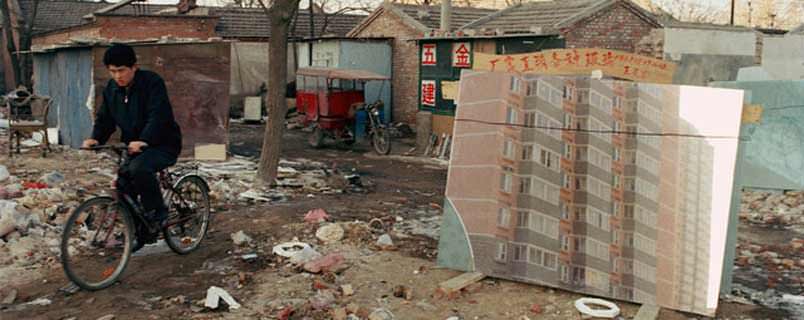 TD Original
TD Original
China: Boom or Boomerang
Dec 3, 2005 At the same time that China is recording huge increases in trade surpluses and currency reserves, deadly riots are breaking out on the outskirts of some of the country's largest cities. In this Dig, scholar Orville Schell challenges the current wisdom about China being an inevitable superpower and unstoppable economic force.Schell challenges the current wisdom that China is an inevitable superpower and unstoppable economic force. 1 2 3 4Perhaps no other country has so many positive and negative trends as the home of a quarter of the world's population.Editor's Note: First the Terminator, then the president-- there is no shortage of people trekking to China, filled with wonderment and doubt about the future of the world's most populous nation and fastest-growing economy. It's a place full of monumental contradictions. There is no one better to make sense of it all in a Dig than Orville Schell, dean of UC-Berkeley's Graduate School of Journalism and author of nine books on China. He has just returned from a trip to China.
A week of protests between villagers and police in China's industrial heartland culminated on Jan. 15 in the death of a 13-year-old girl and the wounding of at least 60. Similar clashes with police and paramilitary units in December left at least 30 dead.
The protests stem from villagers' anger over environmental and land-use issues in the rapidly industrializing country. At the same time, however, that very industrialization played a major role in China's announcement this week of huge increases in trade surpluses and currency reserves.
If you have been impressed by China's extraordinary progress over the last two decades but still harbor uncertainties as to whether its development model will prove viable over the long haul, let me assure you that you are not alone. Indeed, the more one knows about China and the more impressed one becomes, the more difficult it is to assess its successes, much less prognosticate with any certainty about its future trajectory. All one can say with certitude is that, win or lose, it will have a profound effect on the world.
Seen from different vantage points, China can appear to be many different things, even to be moving in forward and retrograde motions at the same time.
[State Department's detailed profile on China]
A business executive who is impressed with the endless new high-rise buildings, neon billboards, shopping malls, luxury hotels and new ring-roads and fly-overs in cities like Beijing, Canton and Shanghai may see an economic miracle whose high growth rates are destined to impel this most dynamic and catalytic agent in the global marketplace forward almost indefinitely.
[RAND-sponsored essay on China and Globalization (.pdf)]
An American general may see China's growing military clout as a sign that Beijing is determined to become the newest superpower, ready to challenge U.S. traditional military dominance not only in Asia but throughout the world.
A student of international development may view China (unlike Russia) as a paradigm of pragmatic reform for having marketized its economy within the political and social context of its old Leninist system, rather than initiating simultaneous political reforms and risking instability.
And admirers of China's respect for education, diligent work ethic and zealous entrepreneurial spirit may see China as an unstoppable engine of labor efficiency, industrial production, managerial energy and even future research.
However, viewed from a different vantage point, from the perspective of a citizen in Harbin drinking benzene-contaminated water, for example, China can appear far less invulnerable and its future progress can seem much less assured.
[Far Eastern Economic Review on The End of the China Love Affair]
When an economist looks behind the impressive growth rates and trade statistics at the country's banking system, financial markets and pension system, he or she may be alarmed by how insubstantial, badly managed and unfairly regulated they are.
[RAND-sponsored report on China's Economic Fault Lines]
A lawyer may worry, despite the advances made in commercial and administrative law, about how shallow are the roots of the rule of law in China, especially when it comes to any case that has sensitive political implications.
Scientists and environmentalists may be alarmed by the recklessness of China's industrialization, wanton exploitation of natural resources and the vast range of environmental degradation they encounter.
Sociologists may find it almost unimaginable that, given the way society is delaminating into rich and poor and that these new class fissures are causing local disaffection and protest, Chinese society can continue to cohere.
Scholars who have studied Chinese history and culture and have an appreciation of how important these aspects of life have been in grounding China in shared assumptions and values may find the deracinated state of the countrys culture, its confused identity, the absence of any true north on its moral and ethical compass, deeply unsettling.
And political analysts hopeful that its increasingly open markets will lead more rapidly to the democratization of political life may find the retro-nature of China's Leninist system of one-party governance, which is almost completely dependent on economic growth for its legitimacy, less than reassuring.
Behind the facade of very real external success, skeptics find perilous and unresolved contradictions everywhere in China. Indeed, it would not be too extreme to say that of all the nations of consequence in the world, there is none with more unresolved major problems.
So, which view best represents the true China: China the unstoppable "economic miracle" or China teetering on the precipice of ever more glaring contradictions?
The truth is that both of these contradictory versions of China are real. This is the case because China is in the process of one of the most tectonic and monumental transitions of any nation in the last hundred years. It is trying to evolve from its Stalinist, centralized, revolutionary past to some new and uncertain future. And the unavoidable, and unanswerable, question is: Will it make it?
To even broach this question one must first ask several others: What does it mean to make it? What is China's model for reform? What will China look like when it "gets there"? In other words, by what standard should we judge its progress?
The best way to understand the range of this contradiction and opinions about its nature is to look at both sides of China's contradictory progress.




You need to be a supporter to comment.
There are currently no responses to this article.
Be the first to respond.